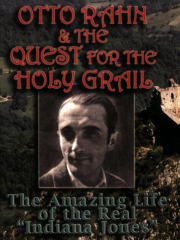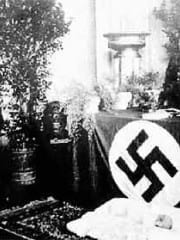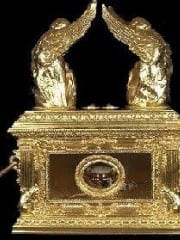Indiana Jones
Otto Rahn's Crusade Against the Grail
William Henry talks to Christopher Jones, who has translated one of the legendary ?hidden? books of our time, Otto Rahn's Crusade Against the Grail. Although Rahn wrote in 1933, it has taken 73 years for it to be published in English. Find out why, then listen to possible Sasquatch cries thanks to the intrepid Linda Moulton Howe!
Amazon Kindle edition of White Lie and the book signing event
WHITE LIE – THE TRUTH IS OUT THERE
Belvianes, France, August 15, 2012 -- The truth is out there and it is much more unbelievable than fiction. Thirty years ago, ‘Raiders of the Lost Ark’ exploded at the box office. The adventures of Indiana Jones were pure fantasy but the man he was based on was very real. His name was Otto Rahn.
Indiana Jones is a pop-culture phenomenon - Spielberg saw to that - making the charismatic relic hunter, who was willing to risk life and limb to outsmart the Nazi’s and beat them to discovering the Ark of the Covenant and the Holy Grail, impossible to forget. Was Indy pure fiction? Not quite.
'White Lie’ is a story about forbidden history, hidden relics and the adventures of a group of people who get involved in something much bigger than themselves. It combines the mission of the Knights Templar - the warrior monks who legends claim discovered a sacred treasure beneath Solomon’s Temple - with Nazi relic hunter Otto Rahn.
Who was the real Indiana Jones?
Although Lucas and Spielberg claim Indiana Jones was only inspired by adventure movies and pulp fiction, people have still suggested real-life inspirations. Tune in to learn more about several contenders, including Roy Chapman Andrews and Otto Rahn.
Audio
Otto Rahn Memorial Website interview with Jeanne D'Août, the Author of White Lie
Hi, Jeanne!
I congratulate you on the release of your book White Lie. This is a great event for all who are familiar with the work, searching and life of Otto Wilhelm Rahn. When did you first hear of him?
Jeanne:
The first time I heard of Otto Rahn was probably during my research of the history of Montségur and the Cathars in connection with Grail lore. I never studied the man himself and only knew what most people know; that he researched Grail lore, visited Montségur and was working for Himmler as a relic hunter in a pre-war Germany. It wasn't until 2008 that a friend sent me "Crusade against the Grail" in English, followed by "Lucifer's Court" and Nigel Graddon's "Otto Rahn, Quest for the Holy Grail". I was thinking of writing a thriller book at that time about the 1st century, and the mysteries of the Languedoc. I had already done a lot of research for the book, but didn't get around to actually writing it, because the financial crisis had made me and my husband work 7 days a week to make a living. In 2011 I first had the chance to sit down properly and started writing in January. I would write almost 18 to 20 hours a day for several months and Otto slowly became one of the key players in the book.
Otto Rahn and the Quest for the Grail: The Amazing Life of the Real "Indiana Jones" by Nigel Graddon
Editorial Reviews
Product Description
Who was the amazing Otto Rahn? How come if Rahn was such an amazing man has hardly anyone outside specialist pre-WW2 history circles ever heard of him? But is he really such an unknown? The story lines of Raiders of the Lost Ark to Indiana Jones and the Last Crusade mirror Rahn’s incredible adventures in the South of France in the early 1930s.
About the Author
Nigel Graddon lives in South Wales with his wife Val, a Special Needs Teacher, and his son Lewis, a science undergraduate. Nigel has written various articles on these topics for historical societies.
Kristallschädel von SS-Führer Heinrich Himmler entdeckt?
Sie sind mystisch und geheimnisvoll – die Kristallschädel der indianischen Hochkulturen. Jetzt wurde einer dieser angeblichen „Götterschädel" in Bayern gefunden. Und der befand sich früher vermutlich im Besitz von SS-Führer Heinrich Himmler! 09.03.2011 — 10:20 Uhr, Bild.de
Wie das Magazin „Mysteries“ berichtet, fand der Schweizer Journalist Luc Bürgin den Schädel (12 Kilogramm schwer, 17,5 Zentimeter hoch, 21 Zentimeter tief) auf dem Dachboden seines bayerischen Informanten – versteckt in einem alten Holzkasten. „Eine Spezialanfertigung, die sich wiederum in einem alten, abgeschabten Tornister aus Leder befand.“
Dieser Fund versetzt Historiker in Aufruhr! Denn seit Jahrhunderten geben die geheimnisvollen Totenschädel Rätsel auf.
Otto Rahn im Wikipedia
Otto Wilhelm Rahn (* 18. Februar 1904 in Michelstadt im Odenwald; † 13./14. März 1939 bei Söll (Tirol), Österreich) war ein deutscher Schriftsteller, Mediävist und Ariosoph,[1] der sich mit dem Gralsmythos beschäftigte.
Leben
Schule und Studium
Rahn wurde 1904 in Michelstadt/Odenwald als erstes Kind des Justizamtmanns Karl und Clara Rahn (geb. Hamburger) geboren. Ab 1910 besuchte er das humanistische Gymnasium erst in Bingen, wo er bis zum Beginn des Ersten Weltkriegs lebte. Sein Abitur machte er in Gießen. Dort begeisterte ihn sein Religionslehrer Freiherr von Gall erstmals für die Geschichte der Katharer. 1922 begann Rahn ein Jurastudium in Gießen, das er an der Albert-Ludwigs-Universität Freiburg und der Universität Heidelberg fortsetzte. 1925 bis 1928 unterbrach er sein Jurastudium und betätigte sich als Handelsreisender für verschiedene Verlage.
Индиана Джонс был нацистом
1 июля Генри «Индиане» Джонсу исполняется 110 лет. У его прототипа тоже юбилей. Только реальному персонажу, чья судьба отразилась в приключениях Индианы, 105 лет. В отличие от своего бравого американского двойника реальный человек был немецким археологом. Звали его Отто Ран. Оказывается, Отто служил в СС и даже получил звание обершарфюрера.
Очки главы СС Генриха Гиммлера поблескивали.
– Абсолютные сила и власть? –переспросил он.
– Все верно, – ответил археолог Отто Ран. – Вообще я склоняюсь к мысли, что Грааль – это скорее идея. Но источники указывают, что Граалем назывался магический предмет, который дарил владельцу безграничные возможности.
– И его можно найти?
Спасти унтершарфюрера Рана
- Вас не удивляет тот факт, мистер Джонс, что ковчег, созданный во времена оные, способен генерировать поле с напряжением до шестисот вольт, - Отто подбросил в костер сухую кедровую ветку, которая, вспыхнув неопалимой купиной, высветила на мгновение лиловую глубину эфиопской ночи и две мужские фигуры.
- Мистер Джонс…Отто, ты дождешься, что я тебя буду называть «Herr Rahn», - Индиана повел носом, не без удовольствия втягивая смолистый дым, - а что должно удивлять? Ящик из белой акации, обитый листами золота? Или зверюга по имени Вольт? Где, кстати, эта тварь бродит? – Индиана нарочито испугано покрутил головой в поисках горящих в ночи яростных глаз Вольта.
What is the Grail?
The Grail. Between 1190 and 1240, it formed the central theme of a series of literary works that spoke of, and appealed to, a new social class, that of the knights and warriors and the adventures they encountered on their travels. In recent decades, it unleashed Indiana Jones on one of his death-defying treasure hunts and was the central ingredient of Dan Brown’s The Da Vinci Code, one of the biggest bestselling novels ever.
For Richard Barber, in The Holy Grail: The History of a legend, “it is, in all its forms, a construct of the creative imagination”. However, for dozens of other authors, the Grail is not a literary invention, but a veritable treasure, out there, somewhere. Unfortunately, in general, studies trying to identify and trace the physical Grail have taken on flights of fancy. The Grail has been linked with countries from the Middle East to America, as well as with the persecuted Cathars and even extra-terrestrial beings. It has been labelled a code word for the Ark of the Covenant, after the Templars allegedly transported it from the Middle East to a new hiding place in France.
- 1
- 2
- 3
- seguente ›
- ultima »










Commenti recenti
13 anni 50 settimane fa
13 anni 50 settimane fa
13 anni 50 settimane fa
13 anni 51 settimane fa
14 anni 2 settimane fa
14 anni 7 settimane fa